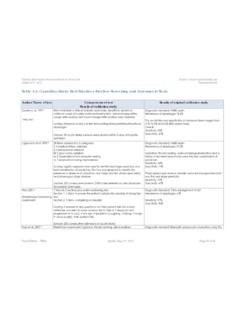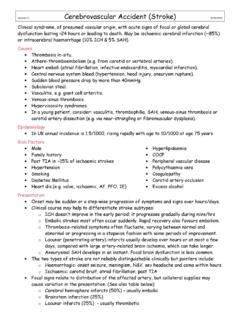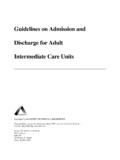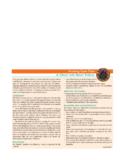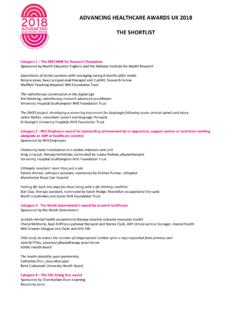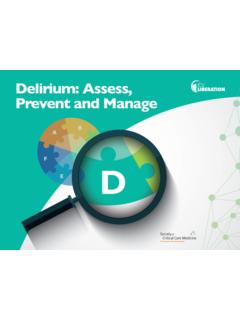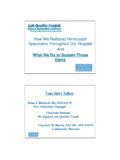Transcription of Package of Essential Noncommunicable ( PEN ) …
1 Package of Essential Noncommunicable (PEN) Disease Interventions for Primary Health Carein Low-Resource SettingsCANCERHEART DISEASE& STROKEDIABETESCHRONICRESPIRATORY DISEASE WHO Library Cataloguing-in-Publication DataPackage of Essential Noncommunicable (PEN) disease interventions for primary health care in low-resource health care . disease. of health care . services - organization and administration. countries. Health 978 92 4 159899 6 (NLM classification: W )Design: in France World Health Organization 2010 All rights reserved. Publications of the World Health Organization can be obtained from WHO Press, World Health Organization, 20 Avenue Appia, 1211 Geneva 27, Switzerland (tel.: +41 22 791 3264; fax: +41 22 791 4857; e-mail: Requests for permission to reproduce or translate WHO publications whether for sale or for noncommercial distribution should be addressed to WHO Press, at the above address (fax: +41 22 791 4806; e-mail: The designations employed and the presentation of the material in this publication do not imply the expression of any opinion whatsoever on the part of the World Health Organization concerning the legal status of any country, territory, city or area or of its authorities, or concerning the delimitation of its frontiers or boundaries.))
2 Dotted lines on maps represent approximate border lines for which there may not yet be full mention of specific companies or of certain manufacturers products does not imply that they are endorsed or recommended by the World Health Organization in preference to others of a similar nature that are not mentioned. Errors and omissions excepted, the names of proprietary products are distinguished by initial capital reasonable precautions have been taken by the World Health Organization to verify the information contained in this publication. However, the published material is being distributed without warranty of any kind, either expressed or implied. The responsibility for the interpretation and use of the material lies with the reader. In no event shall the World Health Organization be liable for damages arising from its meeting report contains the collective views of an international group of experts and does not necessarily represent the decisions or the policies of the World Health Summary9 1 Conceptual framework: Essential NCD Interventions for strengthening equity and efficiency of health systems in low-resource settings and control of Noncommunicable diseases (NCDs) health system equity and efficiency through integration of NCDs into primary health Package of Essential NCD Interventions (WHO PEN) for primary care in low-resource settings: Essential technologies and medicines.
3 Risk prediction tools352 Technical and operational outline: Integration of Essential NCD Interventions into primary care in low-resource settings and implementation at district and national levels and management of major NCDs in primary care of quality, equity, performance and impact 56 References62 Annex A Cost-effectiveness of interventions64 Compact disc (attached to back cover) International Society of Hypertension/World Health Organization (WHO/ISH) risk prediction charts for integrating cardiovascular risk factors and predicting strokes and heart attacks ( )List of participants4 Package of Essential Noncommunicable (PEN) Disease Interventions for Primary Health care in Low-Resource SettingsThe World Health Organization meeting on Package of Essential Noncommunicable disease interventions for primary health care in low resource settings, was held Geneva, on 1 2 December 2008.
4 A preparatory meeting was held in the previous year at WHO head-quarters in Geneva on 22 24 August 2007. The meetings were orga-nized by the Chronic Disease Prevention and Management unit of the department of Chronic Diseases and Health Promotion, Non-communicable Disease and Mental Health cluster, in collaboration with WHO regional of"ces. The implementation plan of the Global Strategy for Prevention and Control of NCDs was endorsed by the World Health Assembly in May 2008. The objective 2 of the NCD Action Plan highlights the need to establish national policies and plans for NCD prevention and control. As one of the key components of this objective, WHO is called upon to provide technical guidance to countries in inte-grating cost-effective interventions against major NCDs into their health systems . Furthermore, the Action Plan proposes that Mem-ber States implement and monitor cost-effective approaches for the early detection of cancers, diabetes, hypertension and other cardiovascular risk factors and establish standards of health care for common conditions like CVD, cancers, diabetes and chronic respiratory diseases integrating when ever feasible their manage-ment into PHC.
5 Hence, the objectives of the meeting were to:Develop a conceptual framework for a Package of Essential NCD Interventions for strengthening equity and ef"ciency of primary health care in low-resource settings; Identify core technologies, medicines and risk prediction tools; Discuss protocols required for implementation of a set of Essential NCD interventions;Develop a technical and operational outline for integration of Essential NCD interventions into primary care and for evaluation of impact. 5A multidisciplinary group of international experts in the "eld of Noncommunicable diseases (NCDs), with speci"c expertise in car-diovascular disease, diabetes, chronic respiratory disease and cancer contributed to them and for the peer review of this report. Collectively, the expertise of the group covered general medicine, cardiology, neurology, diabetes, oncology, respiratory medicine, nephrology, general practice, palliative care , public health and epi-demiology.
6 The composition of the group included specialists, pri-mary care physicians, generalists, health- care managers and nurse practitioners. They were from Algeria, Argentina, Australia, Ban-gladesh, Botswana, Cameroon, China, Denmark, Eritrea, France, India, Ireland, Kenya, Mexico, Mozambique, Nepal, Netherlands, Nigeria, Pakistan, Russian Federation, Saudi Arabia, South Africa, Sri Lanka, Sweden, Switzerland, Syrian Arab Republic, Turkey, Uganda, United Kingdom of Great Britain and Northern Ireland, and United States of America. This work was coordinated by Dr Shanthi Mendis under the overall supervision of Dr Ala Alwan and Dr Benedetto Saraceno. The full list of participants and af"liations are included in the compact disc attached to the back cover. Conflicts of interestAll participants were asked to provide con#ict of interest state-ments using the Declaration of Interests for WHO Experts.
7 None have declared one that was considered signi"cant. Only WHO funds were used for the meetings. 6 Package of Essential Noncommunicable (PEN) Disease Interventions for Primary Health care in Low-Resource SettingsAcronyms and abbreviationsAIDS acquired immunodeficiency syndromeBPblood pressureBPMD blood pressure measuring deviceCOPD chronic obstructive pulmonary diseaseCVDcardiovascular diseaseDALY disability adjusted life yearsDMdiabetes mellitusHIVhuman immunodeficiency virusISHI nternational Society of HypertensionLMIClow- and middle-income countriesMoHMinistry of HealthNCDnoncommunicable diseaseNGOnongovernmental organizationPHCprimary health careQALY quality adjusted life years SBPsystolic blood pressureTBtuberculosisTIAtransient ischaemic attackWHOW orld Health OrganizationWHO PENWHO Package of Essential NCD Interventions9 Package of Essential Noncommunicable (PEN)
8 Disease Interventions for Primary Health care in Low-Resource SettingsExecutive Summary As low- and middle-income countries (LMIC) begin to make gains in combating infectious disease and malnutrition and garner the bene"ts of economic development, they have become increasingly vulnerable to the impact of noncommu-nicable diseases (NCDs). NCDs such as cardiovascular disease (CVD), cancer, respiratory disease and diabetes are already the leading causes of death in all LMIC except those in sub-Saharan Africa. Projected data indicate that there will be a rapid increase in NCDs over the next seven years, including in sub-Saharan Africa. The economic impact of this increase will be substantial because working-age adults account for a high proportion of the NCD burden. Effective approaches to reduce the NCD burden in LMIC include a mixture of population-wide and individual interven-tions.
9 Such cost-effective interventions are already available and include methods for early detection of NCDs and their diagnoses using inexpensive technologies, non pharmaco-logical and pharmacological approaches for modi"cation of NCD risk factors and affordable medications for prevention and treatment of heart attacks and strokes, diabetes, cancer and asthma. These low technology interventions, if effectively delivered, can reap future savings in terms of reduced medical costs, improved quality of life and productivity. However, due to weak health systems, there are substantive gaps in their implementation particularly in LMIC. Ef"cient use of limited health care resources, sustainable health "nancing mechanisms, access to basic diagnostics and Essential medicines and organized medical information and referral systems are imperative for provision of equitable care for people with and at risk of NCDs.
10 They require long-term care that is proactive, patient centered, community based and sustainable. Such care can be delivered equitably only through health systems based on primary health care (PHC). 10 Package of Essential Noncommunicable (PEN) Disease Interventions for Primary Health care in Low-Resource SettingsFurther, two billion people in the world are living below the poverty line and poverty and NCDs are linked through many pathways. Although providing good quality care for the poor is an ethical imperative, due to weak health systems and inad-equate health- care expenditure of many countries, the poor do not have access to services at all or receive substandard services. Furthermore, out-of-pocket expenditure is unac-ceptably high in many LMIC. Countries need to transform and regulate health systems for universal access and social protection.











